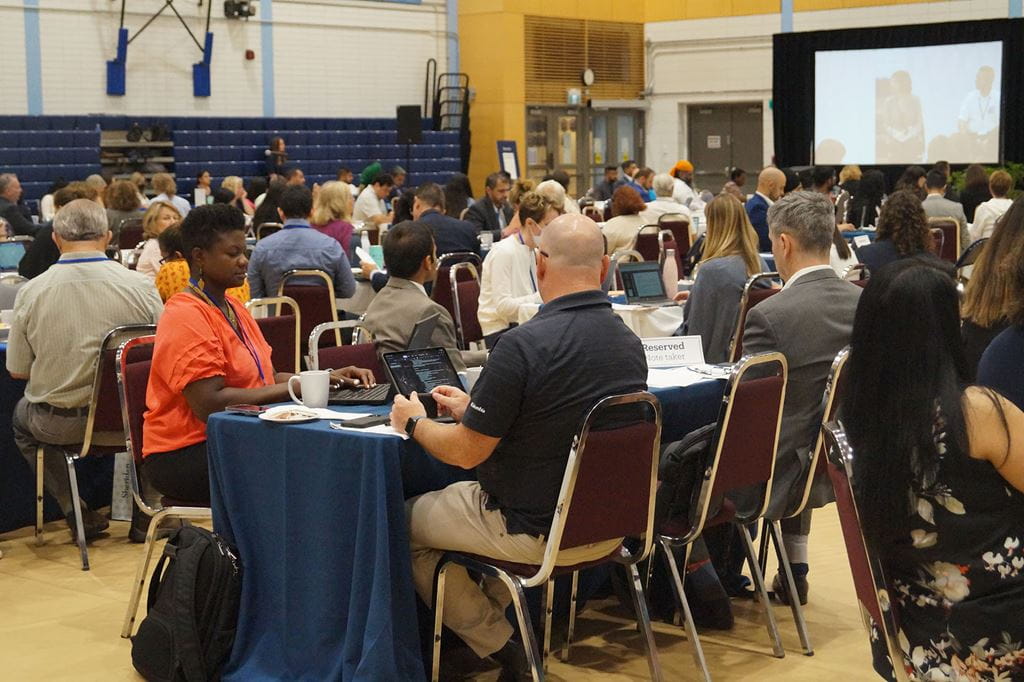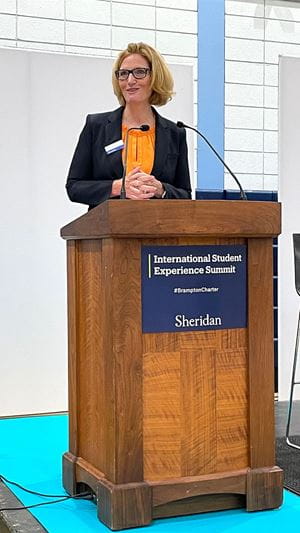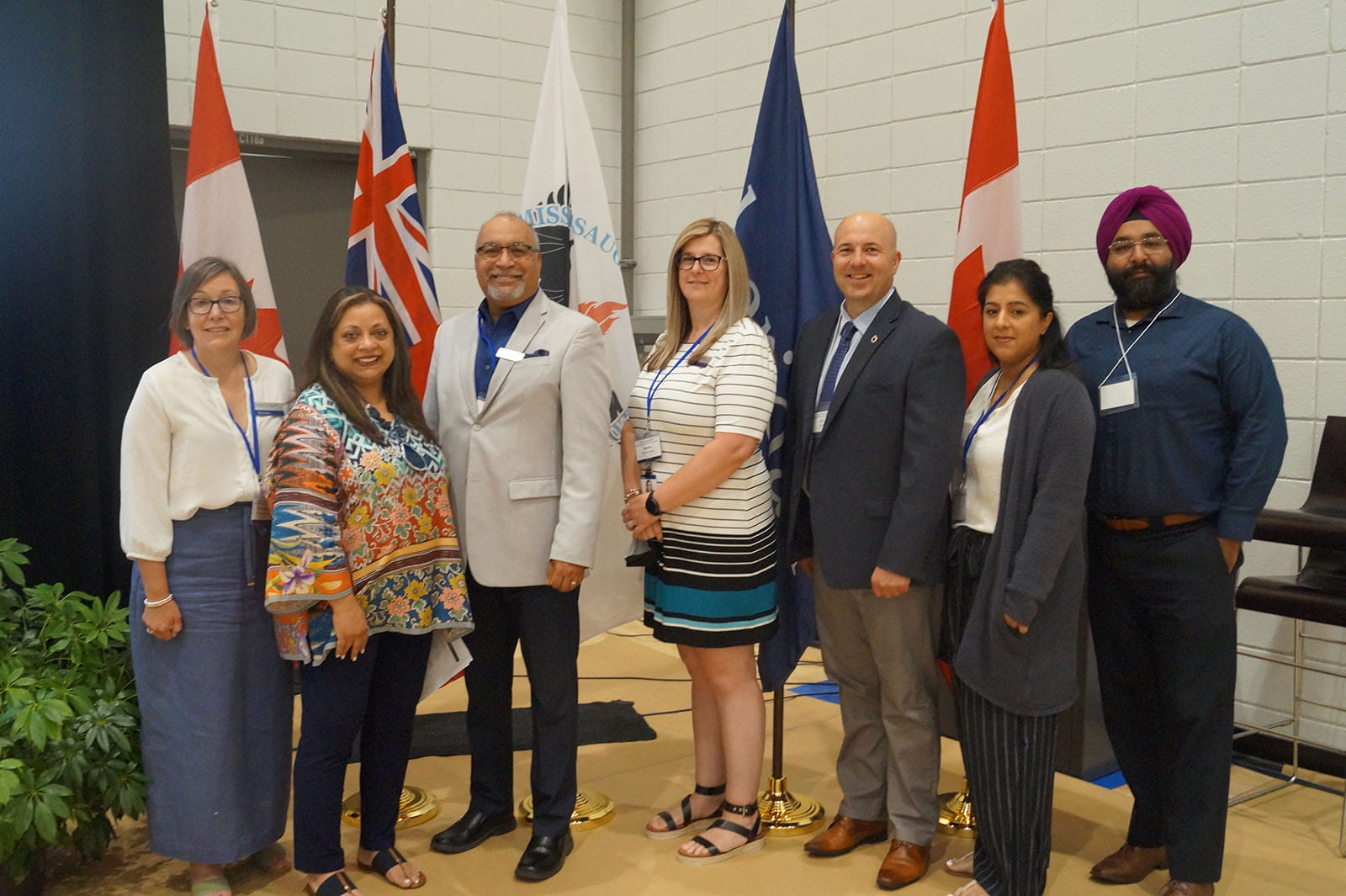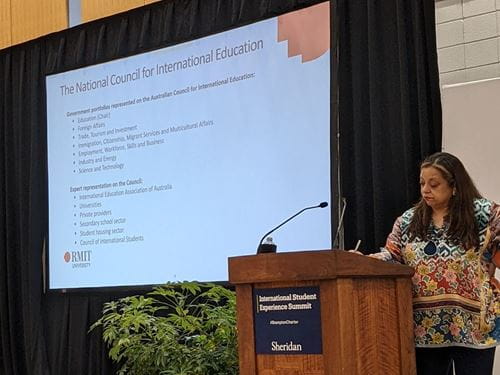
Sheridan College launches collective action to improve international student experience
 by Vitusha Oberoi – Sep 14, 2022
by Vitusha Oberoi – Sep 14, 2022 Honest, thought-provoking conversations, driven by a commitment to bring in transformational change and help craft a positive path forward, marked the Improving International Student Experience Summit held at Sheridan College’s Davis Campus in July.
The two-day conference, organized by Sheridan and the City of Brampton, laid the foundation for a Brampton International Student Charter that’s being envisaged as a road map for making Brampton a best-practice leader in supporting international students.

The summit brought together over 200 participants in person, including members of the federal, provincial, and municipal governments, academic researchers, postsecondary administrators, and community agency leaders. Their unified objective was to lay the edifice for a stronger, brighter tomorrow for international students by eliminating the systemic barriers in their journey toward success.
Collaboration, immediate action needed
In her opening address to the summit’s in-person and virtual attendees, Sheridan President and Vice Chancellor Dr. Janet Morrison said the challenges faced by international students are complex, with many interdependent factors. They require a deep understanding of the issues through innovative, creative and collaborative problem-solving to find holistic solutions. “It’s a shared responsibility that demands our collective and immediate action,” she said.
“International students are at the heart of our learning community. They are critical to the culture and the economics of our country and to the fabric of all of our campuses.”
– Dr. Janet Morrison, Sheridan President and Vice Chancellor
At present, over 8,000 international students from more than 110 countries study at Sheridan. “International students are at the heart of our learning community. They are critical to the culture and the economics of our country and to the fabric of all of our campuses. They enrich our classrooms with diverse, experiences, ideas and perspectives. They make our communities vibrant and embellish the rich tapestry of our multicultural nation. We are humbled by their immense courage,” Dr. Morrison said.
Sheridan College ensures world-class education, overall well-being
Dr. Morrison said Sheridan’s goal had always been to provide international students with a world-class education while ensuring their overall well-being. The College has long-standing, holistic supports and resources to help its international students address mental health, food insecurity, housing and immigration matters. In the 2021-22 academic year, Sheridan’s international students in a time of urgent need received more than $4 million in financial aid through a variety of scholarships, bursaries, and awards. Earlier this year, the College introduced an entrance scholarship for international students enrolled in full-time studies in Spring and Fall 2022 and Winter 2023. Sheridan also expanded its work-study program with support from Scotiabank's ScotiaRISE program to increase opportunities for international students to gain the critical Canadian work experience they need to succeed, Dr. Morrison said.
“Our shared commitment to improving the international student experience will be an impetus that fuels far-reaching reforms.”
– Dr. Janet Morrison, Sheridan President and Vice Chancellor
“Much is being done, not just here at Sheridan, but across the province. And yet a lot more work remains,” Dr. Morrison said. “Many international students face obstacles atypical of domestic students, carry an incredible burden of expectation, and are often wary of accessing resources.” The summit was a unique opportunity to open up crucial conversations on addressing some of these issues. “Our shared commitment to improving the international student experience will be an impetus that fuels far-reaching reforms,” Dr. Morrison said.
Summit’s goal to make Brampton the best-practice leader
The summit was held in the backdrop of a Roundtable convened in the fall of 2021 by Sheridan and the City of Brampton. Briefing the delegates, Christine Szustaczek, Sheridan’s Vice President, External Relations, said the Roundtable, an advisory committee comprising a range of community leaders, got together with one very clear goal in mind: to make Brampton a best-practice leader in Canada for the international student experience.

“We worked as a group of collective community-minded people to define the problems, and we did that by talking about our shared vision of success and about the challenges that each agency or health care provider or police, or a stakeholder, experiences first-hand when it comes to the international students that they serve every day,” Szustaczek said. Once a common understanding of the problems was reached, the group commissioned a literature review that looked at over 180 published resources to understand what’s already available on improving the international student experience. They examined themes of the students’ lived experience and what has been proposed to address the challenges they face before arriving in Canada, during their postsecondary studies, and through their transition to the Canadian labour market.
“We worked as a group of community-minded people to define the problems, and we did that by talking about our shared vision of success.”
– Christine Szustaczek, Sheridan Vice President, External Relations
Extensive research set stage for conference
Szustaczek said the work done by the Roundtable showed that the international student experience is spread over three distinct phases: the application stage; the period of academic studies; and then finally, the transition out of postsecondary studies into the labour market and the journey to obtain a postgraduate work permit, often a pathway to permanent residency.
The Roundtable’s recommendations on what can be done across all levels of government, postsecondary institutions, and community organizations to improve the international student experience across these three phases of their journey formed the basis of the discussions at the summit, Szustaczek said.
“Our hope is that we can create a road map for large-scale social change.”
– Christine Szustaczek, Sheridan Vice President, External Relations
The Roundtable suggested creation of the Brampton Charter for International Student Success to keep the work going and to help achieve the shared vision to make Brampton the best-practice leader in international education experience. With that objective in sight, the Roundtable researched measures for accountability and their impact; charters that exist for postsecondary institutions; and studied legislative instruments in international jurisdictions. “Our hope is that with that as a foundation, we can create a road map for large-scale social change,” Szustaczek said.
International experts share learning
Sheridan’s ground-breaking initiative to synergise community stakeholders and evolve the Brampton Charter to improve the international student experience was underpinned by educational experts not only from Canada, but also from international jurisdictions across many continents and time zones. Many of them shared their learning with the summit via video conferencing, long after it was midnight in their own countries.

Experts from Australia, New Zealand and the United Kingdom participated in a panel titled, “Measures of accountability to enhance the international student experience: Lessons from international jurisdictions,” to apprise the summit of the regulatory and assessing measures in their countries aimed at improving the international student experience.
Introducing the panelists, Roopa Desai Trilokekar, summit facilitator and Associate Professor, Education, York University, said New Zealand, Australia and the UK were almost 20 years ahead of Canada in bringing in regulations governing international student sector.
“New Zealand, Australia and UK are almost 20 years ahead of Canada in bringing in regulations governing international student sector.”
– Roopa Desai Trilokekar, summit facilitator and Associate Professor, Education, York University.

“We’re trying to learn what is the context that really built these regulatory mechanisms – and each one of them has done it very differently – their approaches, to how they've regulated the sector, the processes they followed, who were the stakeholders involved, the successes and the challenges, and then the final issue of how it has really impacted the international student experience in each of these regions,” Trilokekar said. The learning from them would inform the summit in developing the charter, she said.
Addressing the summit well after the sun had set in Australia, Joanne Barker, School of Global, Urban and Social Studies, RMIT University, said Australia's international education industry is governed by a consumer protection legislation, the Education Services for Overseas Students Act (ESOS). It protects the interests of international students in Australia and it is the responsibility of providers to ensure that all aspects of the legislation are met. “In this way, we safeguard the reputation of Australian international education,” she said.
Recognizing international students’ unique issues
Jenni Barrett, policy analyst in New Zealand’s Ministry of Education, said the country has detailed provisions in its 2022 code to ensure the safety and well-being of international learners. These provisions recognize the distinctive, unique circumstances of international students, who are less familiar with the country, culture, language and the different rules and requirements around housing and education. There are consequences for breach of the code: fine, prosecution, and withdrawal of the right to host international students.
In the UK, a national advisory body – UK Council for International Student Affairs (UKCISA) – supports international students and those who work with them. It provides advice, guidance and information about all aspects of the international student experience, Julie Allen, Director, UKCISA, told the summit.
The summit also recognized the need to create awareness and a deeper understanding of the importance of international students in the economic and social spheres. A panel comprising journalists and student advocates discussed how the international student narrative could be shifted to sensitize the community to their life experiences and put the focus on their positive contributions to Canada.
Banner image: Participants at the two-day summit to help improve the international student experience, organized by Sheridan College and the City of Brampton, at Davis Campus on July 25-26, 2022.
Media Contact
For media inquiries, contact Sheridan’s Communications and Public Relations team.





